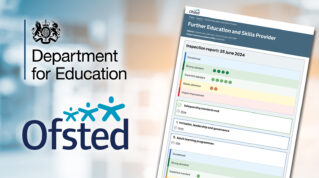Ofsted launched their ‘Big Listen’ exercise last Friday as part of their commitment to consider any changes needed following the tragic death of Ruth Perry. We had the pleasure of meeting Sir Martyn Oliver, the new Chief Inspector, soon after his appointment. His candid, impactful words at last month’s Annual Apprenticeship Conference echoed our discussions about the need for the chief inspector to be in “listening mode” and address the challenges faced by FE and skills as well as schools.
The debate on the appropriateness of single-word judgments has been highly emotive. Calls from some quarters to abolish Ofsted have largely diminished, but there is still significant airtime given to the debate on single-word judgments. Interestingly, at our recent conferences in London and Manchester, the audience’s views differed on their use. While the majority in London preferred Ofsted to continue using them, the majority in Manchester wanted a change.
We suggest that we should not get too distracted by this debate or an alternative scorecard approach, which is ultimately a DfE decision. Instead, we should look more broadly and discuss some alternative challenges and suggestions that need more focus and debate through the Big Listen.
Some AELP members have shared their thoughts on the current grading scale, which only has four grades. They believe that the range between ‘good’ and ‘requires improvement’ is too wide. The Adult Learning Inspectorate (ALI) previously had a seven-grade scale, but we are not proposing a return to that. Instead, we suggest having five grades to better recognise a wider range of provision.
Additionally, some new providers feel that the three judgments on their progress during monitoring visits are too narrow. They propose that Ofsted considers a broader range of monitoring outcomes, along with full inspection grades.
This is ultimately a DfE decision. We should look more broadly
Lastly, some providers suggested to us the need to review the terminology of grades and judgments. While poor provision cannot be dressed up, there is a valid question of whether ‘inadequate’ is still the appropriate description for this grade.
One of the themes in the Big Listen survey is impact and to me this is the really critical one, the ‘so what’ aspect. Independent Training Providers (ITPs) are in a uniquely difficult situation based on the consequences of an inadequate inspection outcome. In the vast majority of cases, a grade 4 outcome means that the DfE will terminate their funding agreement.
This means a forced market exit and ultimately significant disruption for employers and learners at the same time. Unlike other institutions, there is no intervention support or a second chance. Although we would never advocate supporting poor provision, there are times when a provider makes a genuine mistake or simply misunderstands requirements.
The FE and skills system has never been so complex. On this basis, AELP is advocating for Ofsted to bring back the “capacity to improve” judgment. We would also like the DfE to rethink their policy on near-automatic termination where providers are not currently meeting the standard but Ofsted has confidence that they can improve and quickly get better.
Finally, AELP believes that Ofsted has an important role to play in the skills landscape of the future. They can ensure the quality of education and hold providers accountable for their actions when necessary.
However, AELP has already communicated to the chief inspector that Ofsted needs to focus on improving the consistency of inspection, both during the inspection itself and in the outcomes that providers achieve.
Although inspectors are not robots and have a tough job, AELP has heard from its members that some inspectors can still on occasion become too focused on data and not the quality of teaching and training.
Furthermore, some inspectors may not have a background in the types of providers they are inspecting, leading to a lack of recognition of nuanced differences between classroom-based and work-based provision.
The Big Listen is a great opportunity to influence change positively, and AELP looks forward to contributing to that change.
















The ALI had a five point grading system for overall judgements Simon, the seven point system was for grading observation judgements. For me as an inspector back then the five point system worked well but the biggest negative was introduced by Sir Michael with the introduction of requires improvement to replace satisfactory. It gave an entirely different feel to inspection outcomes. Ofsted has lost the plot when grading. I see outstanding given overall when there are weaknesses in the report text, even with a grade 2 for an area, yet no area for improvement given. So come the next inspection a new team will not know what should have been acted on? You can be outstanding and still have some points that need improvement. As you say Simon the gap between the one and a four would benefit from something in-between.
“Furthermore, some inspectors may not have a background in the types of providers they are inspecting, leading to a lack of recognition of nuanced differences between classroom-based and work-based provision.”
This, for me, is very important to get right and prevent “inappropriate” assessments.
Are providers given pre information of the members of the Ofsted team that will inspect them so they can have a quiet word with the lead inspector if they think someone may not have the necessary knowledge and background to deliver a “fair” inspection?
Providers should not be able to veto an Ofsted team member but surely it is better to raise the issure before, rather than after inspection?
In the ALI lead inspectors could request team members with work-based backgrounds and expertise in specific areas. For some reason Ofsted do not see how this helps give an informed inspection.